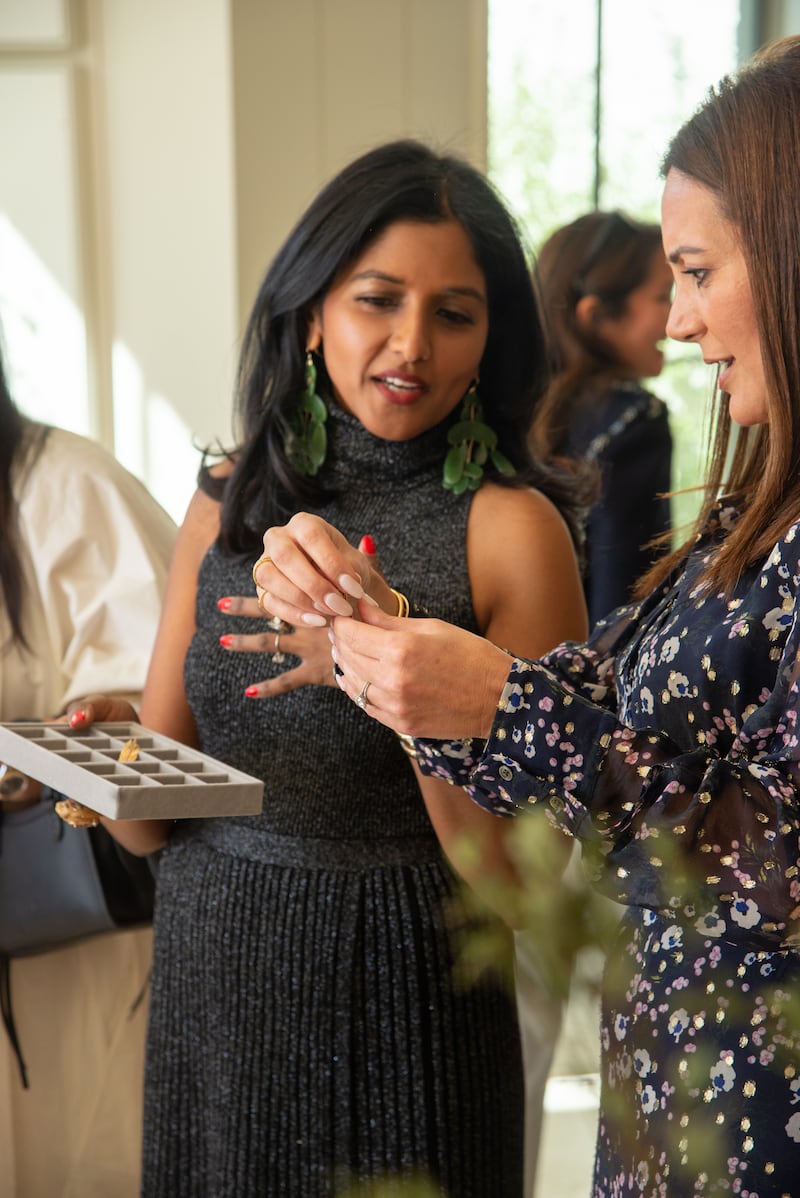
The Business of Fashion
Agenda-setting intelligence, analysis and advice for the global fashion community.

Agenda-setting intelligence, analysis and advice for the global fashion community.

NEW YORK –– Inside a small storefront on Park Avenue, one block from Tiffany & Co., Bulgari and Harry Winston, the designer Rosena Sammi is making her boldest statement yet about who gets to be a part of fine jewellery’s big leagues.
The first pop-up shop for her online collective, The Jewelry Edit, features over 150 fine jewellery pieces — priced $1,000 to $30,000 — from nearly two dozen mostly-women designers, including Katey Walker, Silvia Furmanovich, Jennie Kwon and Pippa Small. Sammi’s hoping the store’s prime location will help in her goal to open up the jewellery business to a wider group of designers.
As an industry, the barriers to entry for aspiring jewellery designers is high. Established houses like Tiffany, Bulgari and Cartier have long dominated the high-end jewellery market, and brands of any size must navigate a market for valuable stones and precious metals where trading is often based on relationships that can span generations.
It can be hard for any emerging jewellery designer or entrepreneur to break in — but doubly so for many Black and brown people, who often lack industry connections that can be essential to getting a business up and running. For minority consumers, the shopping experience can be equally intimidating and exclusionary.
ADVERTISEMENT
“You often feel like ‘Am I dressed up enough? Do I look like I can afford this? Am I asking the right questions?’” Sammi said. “Buying jewellery shouldn’t be like that.”
All of those challenges were top of mind for the New Zealand-born Sri Lankan designer when she launched The Jewelry Edit in the fall of 2020 as an e-commerce site carrying pieces almost exclusively from women designers and priced between $50 and $4,000. Today the site features 60 designers, nearly half identifying as people of colour.
While Sammi is generating buzz, the business is still small. Revenues at The Jewelry Edit, for instance, are still in the six-figure range although they’ve grown 100 percent in the past six months, Sammi said. She is self-funded, but next year will start pitching to investors with the goal of adding more in-person shopping, launching a podcast and amplifying themes like ethical jewellery design.
The pop-up, which opened in October and runs through the end of December, is designed to extend her “responsible, diverse and inclusive” mission to higher-priced fine jewellery and nascent categories like ethically mined gold. The store has hosted five Black, Indigenous and People of Colour (BIPOC) designers who received the Natural Diamond Council’s Emerging Designer financing credit. It also served as the debut of The Jewelry Edit’s “fairmined gold” collection, a private label range made of metal from small-scale mining communities where workers are paid a fair wage, Sammi said.
While it’s nestled in one of the world’s wealthiest neighbourhoods, the goal is to create a space where anyone feels comfortable walking in.
“I’ve had access to that red carpet treatment where you go in and the [jeweller] is wearing white gloves, you get champagne, and you’re being shown around,” she said. “I’ve also been at the checkout counter at Zara and there’s just like some hoop earrings on a turnstile. Why is there no in between?”
In some ways, Sammi was an unlikely entrant to the jewellery industry. While working as a Manhattan attorney in the early 2000s, she found herself itching for a creative outlet and decided to pick up a few night classes at Parsons School of Design in the city. There, Sammi discovered a “passion for jewellery” that she hadn’t previously realised despite her South Asian heritage where “jewellery is very much front and centre and part of our cultural DNA,” she said.
In 2006, Sammi walked away from her law firm “where I had a secretary and car service” to launch her eponymous jewellery brand, which she worked on from her apartment and the New York Public Library, where she dreamed up necklaces, bangles and earrings that were handmade in India. Eventually, her wares landed at luxury retailers like Saks Fifth Ave and Neiman Marcus and in the pages of publications such as Vogue and Harper’s Bazaar. Celebrities like Rihanna and Blake Lively have worn her designs.
ADVERTISEMENT
But even as the brand was racking up wins, the designer found herself unable to ignore the fact that “I was a young woman of colour in a very white male dominated industry,” she said.

“I never met with any people of colour in terms of buyers at department stores,” Sammi added. “I was very much pigeonholed into this box of ‘ethnic jewellery’ … I was often just jewellery under a case or in a drop down box on a website. And no one really knew my story.”
By the time she started scaling back the brand in 2018, she had made private label jewellery for large department stores and chains, where it had become about “making things as quickly and as cheaply as possible,” and she was shifting her focus to philanthropy and social responsibility. (In 2016, for instance, she launched the “Who’s Sari Now” collection of bangles, necklaces, earrings and bags made — using upcycled saris — by Indian women who were rescued from human trafficking.)
Her vision for The Jewelry Edit started taking shape soon after and by the time she launched in September 2020, social justice protests that summer had put diversity, equity and inclusion conversations front and centre across many industries, including fashion and beauty. A handful of direct-to-consumer jewellery brands were creating new competition for heritage houses.
But even as more people were talking about DEI — for instance, the Natural Diamond Council that year supplied $1 million in financing to help emerging designers buy diamonds — Sammi believed jewellery was still lagging in its approach to everything from inclusivity to social responsibility.
For Sammi, it was obvious that The Jewelry Edit had to double as a storytelling platform — to help emerging designers build meaningful, long-lasting relationships with clients — and a mentorship programme where she swaps industry contacts and other tips with new designers. (On the website, The Jewelry Edit features bios and photos of the designers alongside their pieces for sale.)
“Just the fact that she’s going to these lengths to give her clients … an understanding that these sorts of things are even out there is [impressive],” said Victoria Gomelsky, editor-in-chief of the jewellery trade publication JCK and a contributor to The New York Times and Robb Report. “It takes advocates like Rosena to put that out there.”
Educating consumers on how and where their jewellery is sourced as well as on the exclusionary history of the sector was also critical if the site was going to make good on its promise of storytelling. At the pop-up, Sammi has done a mix of exclusive edits like “The India Edit,” featuring five jewellery lines by designers largely unknown in the US.
“She really is shaking up a sector that’s been behind the times,” said Nyakio Grieco, founder of the skincare brand Relevant: Your Skin Seen and co-founder of the beauty e-commerce site Thirteen Lune. “She is going beyond the optics and addressing the fundamental challenge of helping these brands build equitable businesses.”
BoF Careers provides essential sector insights for fashion designers this month, to help you decode fashion’s creative and commercial landscape.
This week, talent expert Suki Sandhu OBE and advisor and executive search consultant Karen Harvey shared insights on the core skill sets expected of leaders and managers in the fashion industry today. BoF Careers shares key learnings from the event.
Discover the most exciting career opportunities now available on BoF Careers — including jobs from Ermenegildo Zegna Group, JW Anderson and A-Cold-Wall.
BoF spoke to HR executives and talent experts at Alexander McQueen, On and Deckers Brands — global employers currently recruiting on BoF Careers — to understand what skills are most relevant to the fashion industry and how to upskill in them in the workplace.